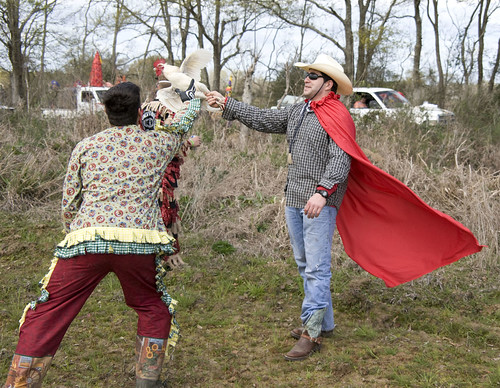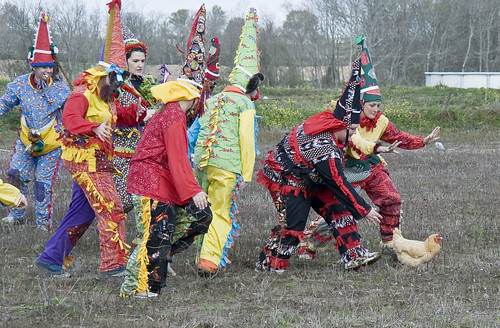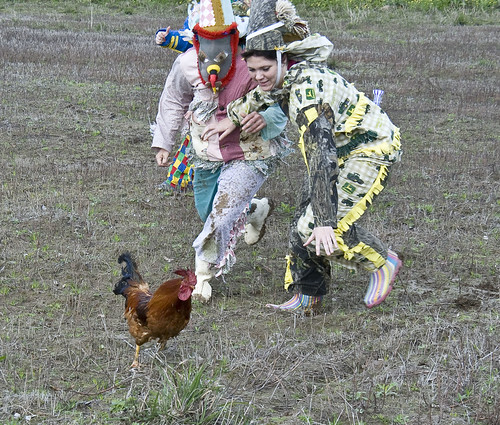
They could see they wheels turning in my brain at Friday night's Bunko, as the hostess's neighbor told stories of her sister's life in a small Cajun town in Louisiana.
When she mentioned some strange local custom that includes chasing chickens, I took out my notebook.
I know there's a story in here, a scene for a novel, or maybe even a whole book, but for now. It's a snippet of strange, and I like being able to bring you that.
If only I could read it all to you with one of these accents:
this older couple
or try it yourself with this guide.

 Direct quotes below from an article by John RoachNational Geographic NewsFebruary 7, 2005.
Direct quotes below from an article by John RoachNational Geographic NewsFebruary 7, 2005.Barry Jean Ancelet is a professor of French and folklore at the University of Louisiana in Lafayette and host of a weekly live Cajun radio show broadcast from Eunice. He said the Cajun Mardi Gras is much more than CHECK OUT THIS VIDEO-> chicken chasing and beer drinking.
"It is a reaffirmation of community. It is a source of homemade entertainment. It has religious, social, and psychological value for all participants, those running and those receiving," he said.
( I like that.)
Carl Lindahl is a professor of English and folklore at the University of Houston in Texas. He has has extensively studied the Cajun Mardi Gras celebration in the town of Basile and agrees with Ancelet's view. "Mardi Gras is about community ties, and almost all outsiders miss this," he said.
Ancelet describes the Cajun Mardi Gras as controlled chaos. Starting early in the morning, masked revelers go from house to house in the countryside. They beg for ingredients and money to make a gumbo that will later be enjoyed by the entire community.
Some people give rice, flour, onions, or money—but one of the ideal ingredients, according to Ancelet, is a live chicken. The chicken is tossed out into an open field. The revelers, many of whom start drinking beer early in the morning, are expected to catch it.
The ensuing chaos is mixed up in a swirl of mock trials, abductions, tree climbing, singing, and other acts of tomfoolery, all of which serve to infuse a burst of energy into the doldrums of winter, Ancelet said.
According to Lindahl, much of the clowning around is associated with skills the region associates with manhood—the ability to ride a horse, dance, sing, play and take jokes, and drink a lot.
( hmmmm. manhood is this??)
"During Mardi Gras, young men try to do all of these things in greatly exaggerated form at the same time, all day long," he said. "The chaos comes in part from the attempt to do all these things at once."
(If only they could teach that real manhood is about responsibility, stability, intelligent choices, providing for family, being loyal, kind and giving. What kind of animal would they have to chase to learn that? Because I'd be willing to fill a stadium and let them loose.)
No comments:
Post a Comment